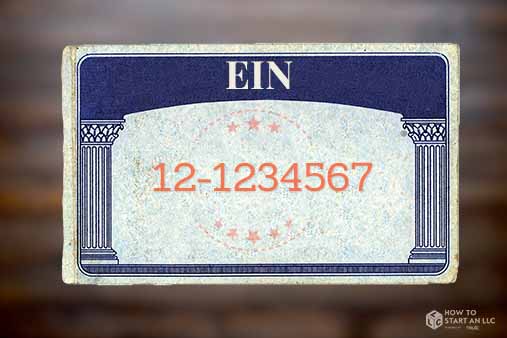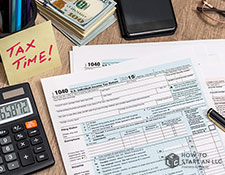WHEN DOES A SOLE PROPRIETOR NEED AN EIN?
There are situations where an EIN (Employer Identification Number) is legally required for a sole proprietor and situations where an EIN is recommended but not legally necessary.
If your sole proprietorship needs an EIN, it is a good time to research choosing between a sole proprietorship vs an LLC.

WHEN IS AN EIN REQUIRED FOR A SOLE PROPRIETORSHIP?
Per the IRS, “A sole proprietor without employees and who doesn’t file any excise or pension plan tax returns doesn’t need an EIN.” Once you hire employees or file excise or pension plan tax returns, you will immediately require an EIN.
A sole proprietor with an existing EIN who becomes a sole owner of a limited liability company (LLC) will require another EIN for the LLC.
Do I Need an EIN for a Sole Proprietorship?
If you don’t have employees or need to file excise or pension plan tax returns, then you aren’t required to have an EIN but you might need one for other purposes. Banking, business credit, and privacy are three legitimate concerns when deciding whether or not to get an EIN for your sole proprietorship.
As a Sole Proprietor, is My EIN Linked to My SSN?
As a sole proprietor, your EIN is not linked to your SSN. This is another benefit of getting an EIN even if you aren’t required to do so. For a full list of the benefits of getting an EIN, see our EIN benefit guide.
Is Sole Proprietorship Still the Best Option for My Business?
If your sole proprietorship is large enough or successful enough to hire employees, then you could be in the position to consider converting your sole proprietorship into an LLC. Forming an LLC is the next step in growing a business.
While being a sole proprietor can be an easy option to run a business with very low profit and low risk, you have zero liability protection.
There are many benefits to holding your business in an LLC, but the most impactful is liability protection. An LLC separates the business owner’s personal assets from the business. This means your personal assets aren’t in jeopardy in the event that the business is sued or can’t pay a debt.
You can learn more about LLCs on our What is an LLC page and our Cost to Form an LLC guide.
Why Get an EIN if It’s Not Required?
There are several valid reasons for getting an EIN even if the IRS says it’s not required:
- If you start your business without an EIN or employees, but then find yourself ready to hire an employee, you will already have an EIN.
- Applying for an EIN instead of using your Social Security number (SSN) will keep your SSN more private and reduce the risk of identity theft.
- Most banks require an EIN in order to open a business banking account. A business bank account is another way to keep your personal finances and professional finances separate.
- Just as a Social Security number tracks your personal credit, the lending and credit agencies use the EIN to track your business’s credit.
- Although an EIN is not required to apply for all business loans, a lot of lenders prefer a company that has established its business credit through a business bank account.
HOW TO GET A FREE EIN FOR YOUR SOLE PROPRIETORSHIP
The quickest and simplest way for taxpayers to get a free EIN is to apply online on the IRS website using the EIN Assistant.
Get an EIN
Option 1: Request an EIN from the IRS
– OR –
Option 2: Apply for an EIN by Mail or Fax
Mail to:
Internal Revenue Service
Attn: EIN Operation
Cincinnati, OH 45999
Fax: (855) 641-6935
Fee: Free
Here is some helpful information to guide you in requesting your EIN number from the IRS EIN Assistant:
- The IRS’s hours of operation for obtaining your EIN are Monday-Friday from 7 am to 10 pm
- Only United States and U.S. Territories-based businesses are eligible
- You must have a valid Taxpayer Identification Number (SSN, ITIN, EIN)
- The entity owner or responsible party may only apply once per day
- Your application must be filled out in one session and cannot be saved
- The session will time-out after 15 minutes if not in use
- You will immediately get an EIN after the form is completed
- Applications cannot be processed if an EIN was previously obtained online
- You can apply for an Employer Identification Number (EIN) by fax or mail by completing Form SS-4.
You can apply for an Employer Identification Number (EIN) by fax or mail by completing Form SS-4.
If you are submitting by fax, send your EIN application to fax number (855) 641-6935.
If applying by mail, submit to Internal Revenue Service, Attn: EIN Operation, Cincinnati, OH 45999.
You will need to answer the following questions on the EIN Assistant:
- What type of business do you wish to start? (LLC, Sole Proprietorship, Corporation, etc.)
- How many owners does your business have, and in what state is your business located?
- Why are you applying for an EIN?
- Who will be the “responsible party” or principal officer of the business?
In addition, you will need to fill out the name, SSN or TIN, and contact information of your business’ responsible party.
International Applicants
If you don’t have a SSN and you are not a U.S. citizen, you can still get an EIN. Simply download and fill out IRS Form SS-4. You can leave section 7b blank.
Learn more about getting an EIN as a foreign person.
FREQUENTLY ASKED QUESTIONS
Having a DBA doesn’t impact whether or not you are required to have an EIN for your Sole Proprietorship. The same rules apply to a sole proprietorship with a DBA as apply to a sole proprietorship without a DBA.
Per the IRS, “A sole proprietor without employees and who doesn’t file any excise or pension plan tax returns doesn’t need an EIN.” Once you hire employees or file excise or pension plan tax returns, you will immediately require an EIN.
A sole proprietor can only be issued one EIN. Other business entities can have an unlimited number of EINs.
You don’t need an EIN if you’re self-employed; you can simply use your Social Security number. However, some people who are self-employed choose to apply for an EIN instead of using their Social Security number to reduce the risk of identity theft; it’s less likely for someone to break into your accounts when you keep business finances and personal finances separate.
No, there is not a difference between an Employer Identification Number (EIN) and a Taxpayer Identification Number (TIN). Both refer to the nine-digit number issued by the IRS for your business.
No, there is not a difference between an EIN and a Federal Employer Identification Number (FEIN). A FEIN can also be referred to as a Federal Tax Identification Number.
It is very easy to look up your EIN, and there are several ways you can do so. First, the IRS will typically quickly email or send a physical letter confirming your EIN application. You can also check business documents such as tax returns to find your EIN printed there.
If you are looking up an existing EIN, use the instructions on our page: How to Look Up an EIN.
You can look up another business’s EIN by searching for the company on the Securities and Exchange Commission (SEC) EDGAR online Forms and Filings database.
If you still aren’t able to find your EIN by checking for a confirmation email or letter, or by identifying it on your business documents, you can simply call the IRS EIN Department at 1-800-829-4933 to speak with one of their representatives. Their hours of operation are Monday-Friday from 7 a.m. to 7 p.m.
An EIN is a nine-digit number issued by the IRS to keep track of a business’s tax reporting. The Data Universal Numbering System (DUNS) is a nine-digit number issued by Dun & Bradstreet, a business analytics company. A DUNS number helps businesses create and identify their credit reports.





